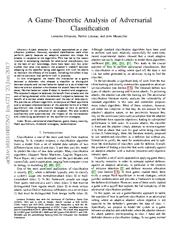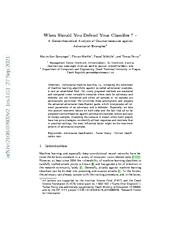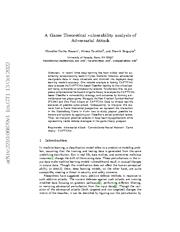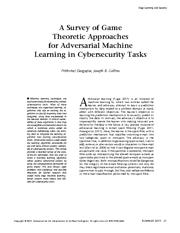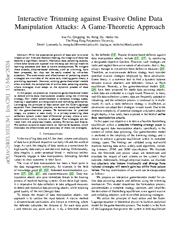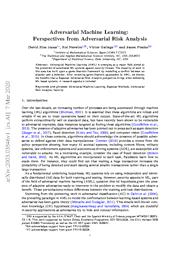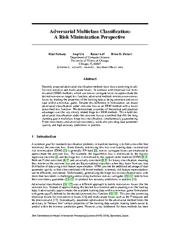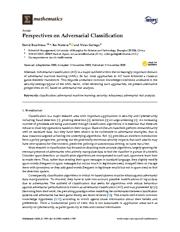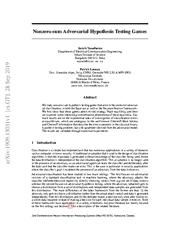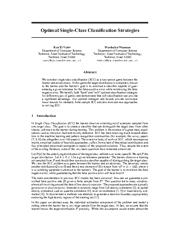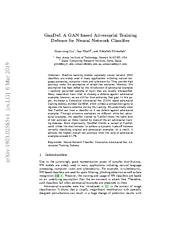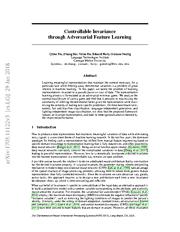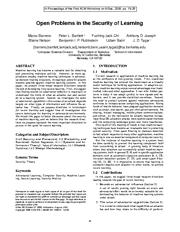A copy of this work was available on the public web and has been preserved in the Wayback Machine. The capture dates from 2019; you can also visit the original URL.
The file type is application/pdf.
Filters
A Game-Theoretic Analysis of Adversarial Classification
[article]
2017
arXiv
pre-print
In this investigation we model the interaction as a game between a defender who chooses a classifier to distinguish between attacks and normal behavior based on a set of observed features and an attacker ...
This has led to the recent interest in developing methods for adversarial classification, but to the best of our knowledge, there have been very few prior studies that take into account the attacker's ...
A Game-Theoretic Analysis of Adversarial Classification Lemonia
Dritsoula, Patrick Loiseau, and John Musacchio Abstract-Attack detection is usually approached as a classification problem. ...
arXiv:1610.04972v2
fatcat:uj5p45v2dfczfknwxkjxyui7qq
When Should You Defend Your Classifier – A Game-theoretical Analysis of Countermeasures against Adversarial Examples
[article]
2021
arXiv
pre-print
We scrutinize these assumptions and propose the advanced adversarial classification game, which incorporates all relevant parameters of an adversary and a defender. ...
Adversarial machine learning, i.e., increasing the robustness of machine learning algorithms against so-called adversarial examples, is now an established field. ...
We do so by proposing a game-theoretical model and a thorough analysis of a minimal instantiation. Our contributions are as follows: 1. ...
arXiv:2108.07602v2
fatcat:irwbfb2rijauti46ql62qv3psq
A Game Theoretical vulnerability analysis of Adversarial Attack
[article]
2022
arXiv
pre-print
To alleviate this, we propose a computational framework of game theory to analyze the CAPTCHA-based Classifier's vulnerability, strategy, and outcomes by forming a simultaneous two-player game. ...
Subsequently, to interpret this scenario from a Game theoretical perspective, we represent the interaction in the Stackelberg Game in Kuhn tree to study players' possible behaviors and actions by applying ...
We evaluate the model from a Game theoretical perspective for the optimal solution. ...
arXiv:2210.06670v1
fatcat:6wz7zapjhvflpp5mv3tmgyjmei
A Survey of Game Theoretic Approaches for Adversarial Machine Learning in Cybersecurity Tasks
2019
The AI Magazine
This article provides a detailed survey of the stateof-the-art techniques that are used to make a machine learning algorithm robust against adversarial attacks by using the computational framework of game ...
A critical vulnerability of these algorithms is that they are susceptible to adversarial attacks by which a malicious entity called an adversary deliberately alters the training data to misguide the learning ...
Acknowledgments The authors would like to acknowledge support from the US Office of Naval Research Summer Faculty Research program for supporting the work of Prithviraj Dasgupta at the US Naval Research ...
doi:10.1609/aimag.v40i2.2847
fatcat:aptetzccqfcwpcszm6s4kj7vtu
Interactive Trimming against Evasive Online Data Manipulation Attacks: A Game-Theoretic Approach
[article]
2024
arXiv
pre-print
Leveraging the principle of least action and the Euler-Lagrange equation from theoretical physics, we derive an analytical model for the game-theoretic process. ...
The evasiveness and effectiveness of poisoning attack strategies are two sides of the same coin, making game theory a promising approach. ...
ACKNOWLEDGEMENT This work was supported by the National Natural Science Foundation of China (Grant No: 92270123, 62072390 and 62372122), and the Research Grants Council, Hong Kong SAR, China (Grant No: ...
arXiv:2403.10313v1
fatcat:z5txkn7s5rhrbavkt6wizajcdy
Adversarial Machine Learning: Perspectives from Adversarial Risk Analysis
[article]
2020
arXiv
pre-print
After reviewing game-theoretic approaches to AML, we discuss the benefits that a Bayesian Adversarial Risk Analysis perspective brings when defending ML based systems. A research agenda is included. ...
The majority of work in this area has built upon a game-theoretic framework by modelling a conflict between an attacker and a defender. ...
After providing an overview of key concepts and methods in AML emphasising the underlying game theoretic assumptions, we suggest an alternative formal Bayesian decision theoretic approach based on Adversarial ...
arXiv:2003.03546v1
fatcat:kjybhxulnrhsfgijpf5gdsti3a
Adversarial Multiclass Classification: A Risk Minimization Perspective
2016
Neural Information Processing Systems
by treating the properties of the training data as being uncertain and worst case within a minimax game. ...
We demonstrate a number of theoretical and practical advantages over the very closely related hinge loss ERM methods. ...
Acknowledgments This research was supported as part of the Future of Life Institute (futureoflife.org) FLI-RFP-AI1 program, grant#2016-158710 and by NSF grant RI-#1526379. ...
dblp:conf/nips/FathonyLAZ16
fatcat:lpwuboevzrgzlah4mb57vyti6i
Generative Adversarial Privacy
[article]
2019
arXiv
pre-print
Under GAP, finding the optimal privacy mechanism is formulated as a constrained minimax game between a privatizer and an adversary. ...
We show that for appropriately chosen adversarial loss functions, GAP provides privacy guarantees against strong information-theoretic adversaries. ...
We also compare the performance of the privatization schemes learned in an adversarial fashion with the game-theoretically optimal ones. ...
arXiv:1807.05306v3
fatcat:pmddbotq4jccpkij4mezdt7cyq
Perspectives on Adversarial Classification
2020
Mathematics
Adversarial classification (AC) is a major subfield within the increasingly important domain of adversarial machine learning (AML). ...
So far, most approaches to AC have followed a classical game-theoretic framework. This requires unrealistic common knowledge conditions untenable in the security settings typical of the AML realm. ...
D.R.I. is grateful to the MTM2017-86875-C3-1-R AEI/ FEDER EU project and the AXA-ICMAT Chair in adversarial risk analysis. We are grateful to stimulating discussions with the referees. ...
doi:10.3390/math8111957
fatcat:425kglsp55b73g4f2xyae4pvfu
Nonzero-sum Adversarial Hypothesis Testing Games
[article]
2019
arXiv
pre-print
We study nonzero-sum hypothesis testing games that arise in the context of adversarial classification, in both the Bayesian as well as the Neyman-Pearson frameworks. ...
Our main results are on the exponential rates of convergence of classification errors at equilibrium, which are analogous to the well-known Chernoff-Stein lemma and Chernoff information that describe the ...
The work of the second author was supported in part by the French National Research Agency (ANR) through the "Investissements d'avenir" program (ANR-15-IDEX-02) and through grant ANR-16-TERC0012; and by ...
arXiv:1909.13031v1
fatcat:yr6j732zj5fsve4jwjwhnf4c34
Optimal Single-Class Classification Strategies
2006
Neural Information Processing Systems
We consider single-class classification (SCC) as a two-person game between the learner and an adversary. ...
We identify both "hard" and "soft" optimal classification strategies for different types of games and demonstrate that soft classification can provide a significant advantage. ...
This simple analysis shows the futility of the SCC game when the adversary is too powerful. ...
dblp:conf/nips/El-YanivN06
fatcat:ox3ggobygnagphzthzfnwueeda
GanDef: A GAN based Adversarial Training Defense for Neural Network Classifier
[article]
2019
arXiv
pre-print
In this paper, we design a Generative Adversarial Net (GAN) based adversarial training defense, dubbed GanDef, which utilizes a competition game to regulate the feature selection during the training. ...
As a result, it achieves the highest overall test accuracy when the ratio of adversarial examples exceeds 41.7%. ...
First, the design of GanDef is introduced as a minimax game of the classifier and discriminator. Then we conduct a theoretical analysis of the proposed minimax game in GanDef. ...
arXiv:1903.02585v1
fatcat:4d6k3aifmjbbxfw4meyte35eim
Using Game Theory to Classify Wireless Ad Hoc Network Attacks with Analysis on Countermeasures
2011
International Journal of Advancements in Computing Technology
By illustrating the different players and game types in a variety of game theoretic approaches, we provide a comprehensive view on game based solutions to attacks in wireless ad hoc networks. ...
Specifically, we present a classification which associates attack characteristics with types of game players and then examine the relationship between attack scenarios and types of corresponding game models ...
We believe our classification on attacks and analysis on the game models can significantly help to design effective game theoretic approaches. Game Model: Stochastic Game. ...
doi:10.4156/ijact.vol3.issue8.35
fatcat:wbhoqofjlndhvkv4vk6mrnkcdy
Controllable Invariance through Adversarial Feature Learning
[article]
2018
arXiv
pre-print
In this paper, we tackle the problem of learning representations invariant to a specific factor or trait of data. The representation learning process is formulated as an adversarial minimax game. ...
We analyze the optimal equilibrium of such a game and find that it amounts to maximizing the uncertainty of inferring the detrimental factor given the representation while maximizing the certainty of making ...
We provide theoretical analysis of the equilibrium condition of the minimax game, and give an intuitive interpretation. ...
arXiv:1705.11122v3
fatcat:d5ixfq564zah5ok3p5gg55rm7i
Open problems in the security of learning
2008
Proceedings of the 1st ACM workshop on Workshop on AISec - AISec '08
First, we suggest that finding bounds on adversarial influence is important to understand the limits of what an attacker can and cannot do to a learning system. ...
Second, we investigate the value of adversarial capabilities-the success of an attack depends largely on what types of information and influence the attacker has. ...
Thus for a game-theoretic analysis "tolerable" adversarial settings could correspond to the learner suffering only O( √ T ) regret. ...
doi:10.1145/1456377.1456382
dblp:conf/ccs/BarrenoBCJNRST08
fatcat:4uk7kufh4zevfgxkvhz7t4qvm4
« Previous
Showing results 1 — 15 out of 16,337 results

